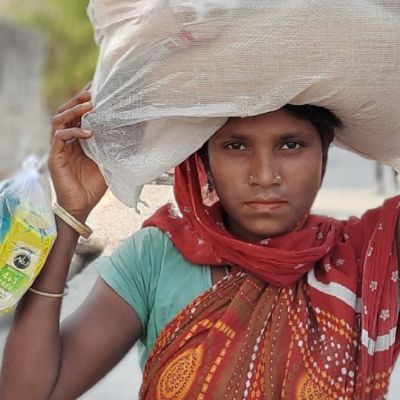Written by Edward Lai (Senior Communication Officer)
As the pandemic is raging around the world, criminals do not only “hunt” civilians in a hidden way in poor villages, they also target their prey via the internet. By using their poor and fragile situation, they can easily force or lure the victims to work in sex industry, or engage in forced labour or any work that is obviously not commensurate with pay. Facing the “new normal” under the pandemic, Aashima Samuel, EFIC@R’s National Director, who has been engaged in anti-child trafficking for many years, shared her team’s coping strategies.
Q: How does your team equip churches and local communities to fight child trafficking?
A: In terms of preventive education, we have conducted online youth seminars. In the seminars, we encouraged young people to participate in the communities’ anti-pandemic work, and explained the current situation of human trafficking to them. We also shared real cases on social media platforms, including how children were trafficked for forced labour, or sold as “brides” to middle-aged people. In the end, we hope to strengthen public awareness of anti-child trafficking.
In the recent floods in Bihar, we found that human traffickers lured the poor to follow them on the pretext of providing jobs to them. In addition, human traffickers took advantage of the government’s humanitarian work under the pandemic, pretending to be humanitarian aid workers, in order to gain the trust of poor communities and pave the way for trafficking in the future. In view of this, we have established close ties with village council leaders. We talked to the leaders about the need to understand the situation of residents leaving the village, as well as paying attention to human traffickers who entered the village. We also encouraged the leaders to embark on the long-term development of villages and bring justice to the victims of trafficking.
In addition, we have set up watch groups in the villages to track all suspicious persons and pay attention to the situation of the children in the villages to ensure their safety. The watch groups also meet regularly with village leaders to discuss how to establish a safe environment for the children. Under the lockdown, we used online instant messaging software to communicate with church pastors, watch groups, vigilantes groups and residents in the district to identify victims. We have successfully rescued three victims recently who were about to be trafficked for sex.
Q: During the pandemic, more children are changing to online learning and socialising, which makes them more vulnerable to sexual predators. How do you deal with this challenge?
A: Nearly half of India’s population is under 25. Young people or children are easily lured by false promises on social media platforms and become prey to sexual predators. To protect them, we should start with personal contact and community monitoring. Therefore, we keep in touch with young people through the network of local communities, watch groups, churches, and volunteers to remind them of online sexual exploitation and teach them how to identify suspected offenders. We also provide training for community residents so that they know how to report any suspected trafficking activities immediately.
Content of this issue
Written by: Clara Chiu (Head of Partnership Development) From July 20th to 23rd this year, several CEDAR staff participated in the “Asia Region Anti-Trafficking Conference” (hereinafter referred to as the conference). The conference was held for the first time three years ago, and this year is the third. It was changed to conduct online due to the pandemic. The purpose of the conference is to gather people from all parts of Asia who are concerned about human trafficking, and learn about it with other forms of modern slavery through various workshops, and know more about the latest anti-trafficking measures. During the meeting, representatives from different organisations mentioned that the situation of human trafficking has become worse under the…
Written by Tony Chan (Senior Partnership Development Officer) “During that long period, the king of Egypt died. The Israelites groaned in their slavery and cried out, and their cry for help because of their slavery went up to God.” (Exodus 2:23) The old Pharaoh promised to the prime minister Joseph that Joseph would take his father’s family to live in Egypt and live in the “best part of the land” (Genesis 47:6), the region of Goshen. Jacob, the ancestor of the Israelites, was able to reunite with his son Joseph and escape the famine with his family, so he seized the opportunity and moved to Egypt with his family of 70 members. Over the years, Jacob’s family and…
Written by Edward Lai (Senior Communication Officer) As the pandemic is raging around the world, criminals do not only “hunt” civilians in a hidden way in poor villages, they also target their prey via the internet. By using their poor and fragile situation, they can easily force or lure the victims to work in sex industry, or engage in forced labour or any work that is obviously not commensurate with pay. Facing the “new normal” under the pandemic, Aashima Samuel, EFIC@R’s National Director, who has been engaged in anti-child trafficking for many years, shared her team’s coping strategies. Q: How does your team equip churches and local communities to fight child trafficking? A: In terms of preventive education,…
Banner image: Ayesha [centre], coordinator of CEDAR’s Nepalese partner, Asha Nepal (Updated on 9 October 2020) Our Nepalese partner recently told us that they rescued two girls from a red light area of India. The situation of the girls was very vulnerable so our partner carried out rescue even under the threat of COVID-19 and closing of borders. These two girls, who were physically and mentally weak, had undergone different circumstances. One of the girls named Nagina (pseudonym, 11 years old) had been sold by her own mother to a relative as a servant, due to poverty. The other girl named Lola (pseudonym, 16 years old) had been harassed sexually by her own father, after the death of…






